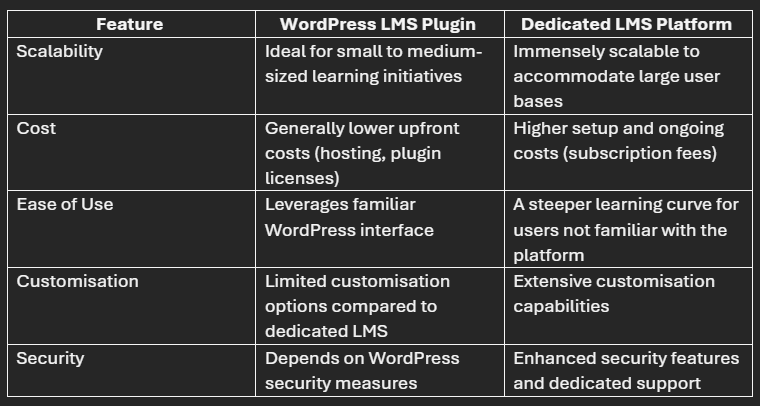Just look around you. You will notice that the rise of online learning has revolutionised how knowledge is spread and skills are attained. On top of this, Learning Management Systems (LMS) have become the hallmark of online education as they offer a centralised platform for tracking learner progress, managing assessments, and delivering courses.
However, since WordPress is also growing in popularity, there seems to be a new alternative in the town: WordPress LMS plugins. Such plugins let users transform their WordPress sites into powerful and highly effective learning platforms, thereby providing a cost-effective and convenient solution.
All of this brings forth the question: When talking about online learning, should you go with a dedicated Learning Management System (LMS) platform or a WordPress LMS plugin?
The decision between a WordPress LMS plugin and a dedicated LMS platform depends on a host of factors, and more on this is stated in this blog.
First, let’s do a somewhat detailed analysis of the important characteristics:
Glancing over the Benefits of WordPress LMS Plugins
WordPress LMS plugins present brilliant solutions to organisations that seek to enter the online learning arena without huge upfront investments. Let’s take a good look at some important related advantages:
Effortless Integration with the Present Plugins and Themes
WordPress LMS plugins seamlessly integrate with many of today’s most renowned WordPress themes and plugins. This means that you can customise the look and feel of your learning platform so that it matches your branding and leverages the already present website’s functions.
Wide Variety of Features
A host of reputed WordPress LMS features present a robust set of features that serve different learning needs. Such functionalities usually include reporting capabilities, progress tracking, assignment and quiz creation, content management options, and course creation tools.
Leverage the Present WordPress Infrastructure
Companies that are utilising WordPress can effortlessly integrate a WordPress LMS plugin into their present website. This will remove the requirement for separate hosting and decrease initial setup costs. Furthermore, the familiar WordPress interface makes way for a quicker learning curve for administrators who are accustomed to managing WordPress sites.
Shortcomings of WordPress LMS Plugins
WordPress LMS plugins may present you with a host of advantages, but they are also associated with various limitations, such as:
Limited Customisation
WordPress LMS plugins present a lesser degree of flexibility in customisation options than dedicated LMS platforms. This can be limiting for companies that have particular branding requirements or those requiring a tailored learning experience.
Security Considerations
Depending on a WordPress LMS plugin demands security update-related vigilance. Outdated plugins having vulnerabilities can present security risks for the platform, especially the learner data. The implementation of robust security measures and regular plugin updates are crucial.
Possible Performance Limitations
A WordPress LMS plugin may not effectively handle the demand of large-scale learning deployments with a high volume of users and various courses. Performance issues such as slow loading times could hamper someone’s learning experience.
Dedicated LMS Platform: Control and Reliability
Dedicated Learning Management Systems (LMS) platforms are created with online learning delivery in mind. Such platforms present a diverse range of features and functionalities created to serve a huge range of learning needs. This makes them a good choice for companies with massive user bases and complex learning programs.
Dedicated Support and Enhanced Security Measures
Dedicated LMS platforms usually prioritise reliable security measures and present dedicated support services. This offers a sense of relief and permits access to technical assistance whenever required.
Advanced Features and Functionalities
Dedicated LMS platforms present a host of advanced features as compared to WordPress LMS plugins. This can have functions such as robust reporting and analytics dashboards, collaborative learning activities, social learning tools, and gamification elements.
Scalability to Handle Complex Learning Programs and Large User Bases
Dedicated LMS platforms can seamlessly scale, accommodating a prominent amount of learners and managing learning programs with various learning pathways, assessments, and courses.
Weaknesses of Dedicated LMS Platforms
So far, it has been established that dedicated LMS platforms present prominent benefits, but they are also associated with some weak spots. These include:
- Higher ongoing costs and setup
- A steeper learning curve for users not familiar with the platform interface
- Less flexibility when it comes to integrating with present tools and websites
Interested parties should thoroughly analyze these weak points in accordance with their scenario.
Selecting the Right Solution – Consider these Factors
The decision between a dedicated LMS platform and a WordPress LMS plugin depends on a careful assessment of your particular resources and needs. These are the factors to take note of:
- Technical expertise and resources
- Target audience and learning needs
- Scalability requirements
- Budgetary constraints
Concluding Remarks
Both dedicated LMS platforms and WordPress LMS plugins have immense value across the online learning landscape. The right choice relies on your particular learning objectives, resources, and needs.
Try taking proper note of the strengths and weaknesses of every option, then evaluate the factors stated in this post. This will certainly allow you to make informed decisions and go with a tool that rightfully empowers you to create an engaging and successful online learning experience for your audience.
Finally, for companies with a significant budget and highly specific needs, partnering with an LMS development company to make a customised LMS platform may be the best solution.
